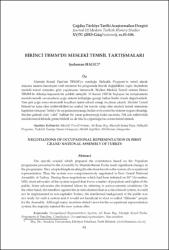| dc.contributor.author | Halıcı, Şaduman | |
| dc.date.accessioned | 2019-10-19T16:03:40Z | |
| dc.date.available | 2019-10-19T16:03:40Z | |
| dc.date.issued | 2015 | |
| dc.identifier.issn | 1300-0756 | |
| dc.identifier.uri | http://www.trdizin.gov.tr/publication/paper/detail/TVRreE9UY3lNZz09 | |
| dc.identifier.uri | https://hdl.handle.net/11421/14202 | |
| dc.description.abstract | Mustafa Kemal Paşa'nın TBMM'ye sunduğu Halkçılık Programı'nı temel alarak anayasa tasarısı hazırlayan özel encümen bu programda büyük değişiklikler yaptı. Seçimlerin mesleki temsil sistemine göre yapılmasını benimsedi. Böylece Mesleki Temsil sistemi Birinci TBMM'de oldukça kapsamlı bir şekilde tartışıldı. 18 Kasım 1920'de başlayan bu tartışmalarda mesleki temsili savunanların çoğu sistemi halkçılığın gereği, halkın hakkı olarak değerlendirdi. Yine pek çoğu sosyo-ekonomik koşullara işaret ederek emeği ön plana çıkardı. Mesleki Temsil Sistemi'ne karşı olan milletvekilleri ise sınıfsal bir temele sahip olan mesleki temsil sisteminin kapitalist olmayan Türkiye'de uygulanamayacağı, halkın seviyesinin bu sisteme uygun olmadığı, Meclise gelecek olan 'cahil' halktan bir yarar gelmeyeceği tezini savundu. Pek çok milletvekili mesleki temsil lehinde görüş bildirdi ise de Meclis çoğunluğu bu sistemi kabul etmedi. | en_US |
| dc.description.abstract | The specific council which prepared the constitution based on the Populism programme presented to the Assembly by Mustafa Kemal Pasha made significant changes in the programme. They adopted implementing the elections based on the system of occupational representation. Thus the system was comprehensively negotiated in First Grand National Assembly of Turkey. During these negotiations which had been initiated on 18th November, 1920, most advocates of the system argued that it was a matter of populism and rights of the public. Some advocates also featured labour by referring to socio-economic conditions. On the other hand, the members against the system claimed that as a class-based system, it could not be implemented in non-capitalist Turkey, the intellectual background of the public was not ready for such a system and it would not beneficial to elect so-called 'illiterate' people for the Assembly. Although many members stated views for the occupational representation system, the majority rejected the new system offer. | en_US |
| dc.language.iso | tur | en_US |
| dc.rights | info:eu-repo/semantics/openAccess | en_US |
| dc.subject | Tarih | en_US |
| dc.title | Birinci TBMM'de Mesleki Temsil Tartışmaları | en_US |
| dc.title.alternative | Negotiations of Occupational Representation in First Grand National Assembly of Turkey | en_US |
| dc.type | other | en_US |
| dc.relation.journal | Çağdaş Türkiye Tarihi Araştırmaları Dergisi | en_US |
| dc.contributor.department | Anadolu Üniversitesi, Edebiyat Fakültesi, Tarih Bölümü | en_US |
| dc.identifier.volume | 15 | en_US |
| dc.identifier.issue | 31 | en_US |
| dc.identifier.startpage | 81 | en_US |
| dc.identifier.endpage | 106 | en_US |
| dc.relation.publicationcategory | Diğer | en_US] |
| dc.contributor.institutionauthor | Halıcı, Şaduman | |


















